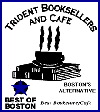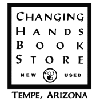- Categories:
Bookstore Cafés, #1 -- Six Degrees of Percolation: The Pros and Cons of Bookstore Cafés
These days, the screech and hiss of an espresso machine is as common a sound in a bookstore as the beep of a cash register or the introduction to an author reading. An increasing number of bookstore owners are now required to know almost as much about paninis and half-caf-two-percent cappuccinos as they do about Michael Chabon and Margaret Atwood.
So, if your bookstore doesn't have a café, should it? And if it already does, how do you go about improving it?
It turns out that booksellers have wildly divergent views on bookstore cafes. Some believe you should start small. Others argue that just an espresso machine and a few pastries won't do a thing for your bottom line. Some booksellers insist you should partner with an existing business while others contend that by going that route you lose control and potential revenue. It's an aspect of the book business that hasn't received a lot of discussion -- particularly because the food business has so little in common with bookselling.
In a series of three articles, BTW will examine the pros and cons of bookstore cafés. We'll briefly address 1) questions to consider before you decide to open a cafe, 2) strategies for opening or partnering, and getting through your first year, and 3) strategies to make an existing café more efficient and profitable. Today's installment poses two essential questions you need to ask yourself before deciding whether or not to add a café to your bookstore.
What do you hope to gain by opening a café?
 According to the booksellers to whom BTW spoke, at the outset you need to carefully analyze why you think a café is necessary and clearly define your goals. "You've got to know what you want," said Bernard Flynn of Trident Booksellers and Café in Boston, which pioneered the bookstore-café combination 20 years ago. "You have to determine if you just want coffee in your bookstore for atmosphere and no profit, or if you're doing it to make more money."
According to the booksellers to whom BTW spoke, at the outset you need to carefully analyze why you think a café is necessary and clearly define your goals. "You've got to know what you want," said Bernard Flynn of Trident Booksellers and Café in Boston, which pioneered the bookstore-café combination 20 years ago. "You have to determine if you just want coffee in your bookstore for atmosphere and no profit, or if you're doing it to make more money."
There can be any number of answers to this question, but most booksellers tend to fall into two groups on the issue. The first are those booksellers who simply want to add to the store's general atmosphere and, as a result, to attract more book-buying customers. For these booksellers, having a profitable café is secondary to the ambiance it provides to the store.
The second group sees a café as a new revenue source.
Both groups have the same goal in mind, of course: generating additional profit. And, yes, ideally, you'd like to have it both ways. But profit isn't a sure thing. One bookseller reported that in his small café with five full-time equivalent employees and several dozen tables, an exceptionally busy weekend day might bring in just $700 in sales. Weekdays can be as low as $200 to $400, and yet might still be considered a "success" if, over time, you can attract more book-buying customers.
![]() "Do you need to make a profit, or are you doing it to improve the appeal of your store?" said Carl Ryan, manager of Atticus Bookstore Café in New Haven, Connecticut. "Independent stores are constantly faced with these decisions -- between what's really going to boost business and what just feels good to do," he said. "I'd just be very careful not to succumb to the idea of what's fashionable."
"Do you need to make a profit, or are you doing it to improve the appeal of your store?" said Carl Ryan, manager of Atticus Bookstore Café in New Haven, Connecticut. "Independent stores are constantly faced with these decisions -- between what's really going to boost business and what just feels good to do," he said. "I'd just be very careful not to succumb to the idea of what's fashionable."
All of the booksellers contacted for this story recommend having a clear sense of motive: Do you believe your store needs a café just because the chain store across town has one? Do your customers really want or expect coffee from your bookstore? Do you really want to dedicate your time and money to espresso and scones?
 Some booksellers interviewed believed that, yes, their customers expected that a café was a necessity. Ensuring it was profitable was an important, but, in some ways, secondary concern. "We did it to keep up with the Joneses," said Howard Mandel, owner of Transitions Bookplace, a specialty bookstore in Chicago focusing on "personal growth, inward exploration, and the pursuit of spirituality," that also contains a small café and restaurant. Gayle Shanks, co-owner of Changing Hands Bookstore in Tempe, Arizona, agreed that coffee is a necessary draw for her customers, although she recognizes this may not be the case for all stores. "We've trained people in this country that coffee and books belong together. For many of us, you now have to provide more than just books."
Some booksellers interviewed believed that, yes, their customers expected that a café was a necessity. Ensuring it was profitable was an important, but, in some ways, secondary concern. "We did it to keep up with the Joneses," said Howard Mandel, owner of Transitions Bookplace, a specialty bookstore in Chicago focusing on "personal growth, inward exploration, and the pursuit of spirituality," that also contains a small café and restaurant. Gayle Shanks, co-owner of Changing Hands Bookstore in Tempe, Arizona, agreed that coffee is a necessary draw for her customers, although she recognizes this may not be the case for all stores. "We've trained people in this country that coffee and books belong together. For many of us, you now have to provide more than just books."
Do you have the commitment to learn a completely different business?

Working as a waitress or an espresso barista for a year doesn't qualify. And there's very little about bookselling that translates to coffee and food sales. Transitions Bookplace's Mandel agrees. When asked if there was anything in bookstore management that prepared him for the restaurant business, his answer was blunt: "No, there isn't." It may seem obvious, but it bears repeating: Bookstores and restaurants are two very different businesses. Each requires a unique set of skills and experience to run successfully.
Buying from food suppliers is different from buying from publishers and distributors. In a café, you're required to set prices. You can't return milk. Health codes need to be met. Equipment is a big capital expense, and maintenance is a constant concern. Staffing is a big challenge. "I thought turnover was bad in bookselling," said John Teague, general manager of Politics & Prose in Washington, D.C. "In a café it's a revolving door. I wait a month before I even bother to learn their names."
In fact, at Politics & Prose, they're getting out of the café management business. "My belief is that booksellers should be selling books," said Teague. Teague and his staff found that, although they had separate staff and management assigned to their in-store café, the issues associated with the café constantly overtook management meetings. "We were always talking about moldy bread," said Teague. "The café became a source of aggravation and frustration. It was one thing to say that we had to get our food costs down. But how do you do that? We didn't have the practical knowledge." As a result, Politics & Prose is now in the process of letting an experienced local coffee shop owner take over the café and run it independently.
At Changing Hands, owner Shanks decided from day one that her store would team up with an existing bakery café. She was content to let the bakery profit from the coffee and food sales, while Changing Hands used the association with the café to attract customers and boost its sales. "We recognized that we're booksellers, we didn't know the restaurant business, and we didn't have the inclination or time to learn it."
Admittedly, the above two questions are just one of many considerations. The scope of this article can't even begin to touch on all the different factors you'll need to consider before determining to open a café: your competition, clientele, the capital you have available, city codes and requirements, your building's configuration.
 Of course, the most valuable resource is talking to fellow booksellers who've made the leap. Another resource to consider is the Portland Oregon-based magazine Fresh Cup, which covers the specialty coffee and beverage industry. They're online at www.freshcup.com. The North American Specialty Coffee and Beverage Retailers' Expo (NASCORE) also takes place this year in Portland, Oregon, September 20-22. For more info, visit www.nascore.net.
Of course, the most valuable resource is talking to fellow booksellers who've made the leap. Another resource to consider is the Portland Oregon-based magazine Fresh Cup, which covers the specialty coffee and beverage industry. They're online at www.freshcup.com. The North American Specialty Coffee and Beverage Retailers' Expo (NASCORE) also takes place this year in Portland, Oregon, September 20-22. For more info, visit www.nascore.net.![]()
Click here to read the second article in this series, which explores different approaches to the caf business: small cafs vs. larger cafs, and bookstore-owned cafs vs. cooperative partnerships.-- Andrew Engelson

